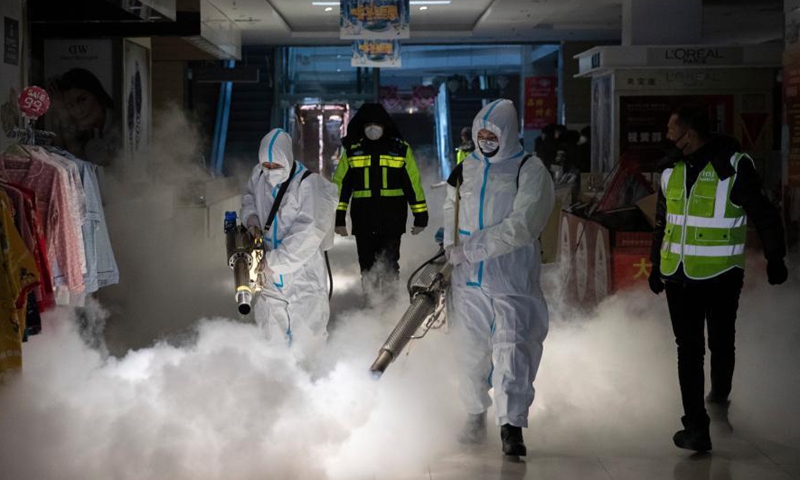
Members of the disinfection team work at a shopping mall in Suihua City, northeast China's Heilongjiang Province, Jan. 18, 2021. A team of 25 volunteers has carried out disinfection tasks in Beilin District of Suihua City to curb the spread of the COVID-19 epidemic in the wake of newly emerged cases. Photo: xinhua
Northeast China's Heilongjiang Province held 16 officials accountable for being slack in anti-epidemic control work, seen by many as the latest example of China's increasingly strict accountability mechanism to build strong state governance and Party discipline.
China's accountability mechanism over official management has shown no sign of slackening despite the COVID-19 epidemic; instead, the role of officials and cadres has been strengthened since last year in the face of the public health crisis, observers noted.
Of the 16 officials, key officials including Wang Shumi and Zhao Guoli - two deputy heads of Wangkui county, the epicenter of this outbreak, which is administered by the city of Suihua - and Sun Zhiyong, a member of the Standing Committee of Communist Party of China Wangkui Committee, as well as Chen Liyao, the head of the health department of Wangkui county, are on the list, according to the discipline inspection commission of Suihua, Heilongjiang on Tuesday.
The local commission slammed the 16 officials' lack of political stance, saying they had been irresponsible and paralyzed in their thoughts. Their "formalism and bureaucracy" in the epidemic prevention and control work had led to a clustered epidemic in the county.
They bear "unshirkable responsibility" for the existence and spread of the epidemic in the province, the notice said.
A number of officials across the nation - including city mayors and local health commission directors - have been punished for wrongdoings in the viral fight since last year. Some were accused of drinking alcohol, while others disregarded the sufferings of the people, the Global Times found.
China has built a strict accountability mechanism on Party discipline, which has become quite "prominent" and well-implemented amid the public health crisis as facing a great test full of uncertainties, Xue Lan, a professor and former dean at the School of Public Policy and Management of Tsinghua University in Beijing, told the Global Times on Tuesday.
Xue said that the trend of imposing a strict accountability mechanism fully displays China's resolution to build strong state governance and Party discipline.
The country and people anchor their hopes on government officials at all levels to steer the overall epidemic situation. Whether they are able to be responsible at their posts is a key factor in whether outbreaks can be controlled, the expert said.
Also on Tuesday, two hospitals in Shijiazhuang, North China's Hebei Province - the People's Hospital of Gaocheng district and the traditional Chinese medicine hospital of Xinle - were publicly criticized by the joint anti-epidemic group led by the State Council, the nation's cabinet. The two hospitals failed to implement anti-epidemic procedures, according to a notice put up on the website of National Health Commission.
In early January, Hebei held three officials from Gaocheng district, Shijiazhuang accountable. The deputy head of the Gaocheng district government, for example, was accused of improper deployment and ineffective inspection over the epidemic control.
Previously, three officials in Northeast China's Jilin Province were held accountable in violations of discipline amid the epidemic.
The Global Times learned from many ordinary Chinese who said they witnessed how many high-level and grassroots officials had devoted themselves in the battle against the virus since 2020, and they have pinned great hopes on them to help the public get through the difficult times.




